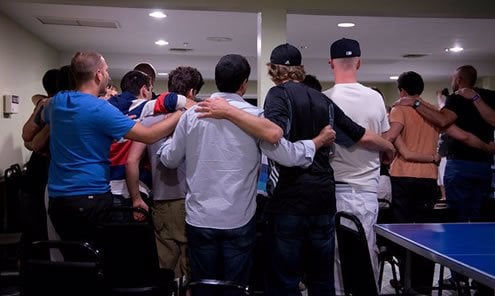Donna Miller’s daily planner reads a bit different than most. Meetings with lawyers and probation officers. Intake of young man addicted to cocaine. Therapy session with family torn apart by Dad’s gambling. Just another day in the life of the director of the Chabad Residential Treatment Center of Los Angeles.

But Donna Miller doesn’t see herself as a superwoman. She says she’s just blessed to have a meaningful job. A series of “circumstances” led to her involvement with rehab and Chabad.
“I was studying to be a family therapist and wanted to integrate Jewish values into my work. My guidance counselor suggested I intern at Chabad,” Donna recalls. “I did my intern hours, completed my license and then stayed for eight years, eventually developing a family program for our women’s treatment center.” Donna discovered that she loved the field of addiction, and continued working in it at another Jewish rehab center in LA.
After some time she came back to Chabad as a supervisor for interns, where she started strengthening the existing programs. A rabbi from Israel who was working there, Rabbi Meir Kohen, saw her effectiveness and told her straight out: “You need to become the director here.”
Donna really wasn’t looking for that level of responsibility, but, she says with a laugh, “I took it, and that was over 15 years ago. It was quite challenging, and one of my primary focuses was on developing more Jewish programming. The center was always kosher, with holiday celebrations and a warm atmosphere, but I built our shul (synagogue) and added more Torah classes, which are not mandated but offered. We now have a full-time and several part-time rabbis teaching classes and mentoring.”

She offered the center much more than enhanced programming, adding a unique perspective and tools to the recovery strategy. “I used every component of my background that I could. I was trained in promoting adult moral development, which is a different approach for molding and inspiring behavioral changes.
“Rather than solely focusing on discipline and a reward-and-punishment system, we try to promote a higher level of moral reasoning. The nature of addiction is that is tends to lower one’s functioning to a more hedonistic and self-serving level. To truly change internally, the addict needs to feel understood, to learn to receive love and care, to be more service-oriented, giving and cooperative. We try to help our clients reclaim their true selves and develop a desire for a meaningful life.”
Moral education? That sounds like a fit with Chabad.
Donna relates, “Chabad got involved with drug treatment over 40 years ago. Rabbi Cunin [the director of Chabad of the West Coast] had a Chabad House on the UCLA campus. After becoming aware of the drug problem of some students, he raised his concerns with the Rebbe. The Rebbe emphasized the importance of helping the students to get well, and with the Rebbe’s guidance, Rabbi Cunin opened the Chabad Residential Treatment Center in 1968. He was truly a pioneer in the Jewish community.” Today, although based on Torah values, the center’s programming is nonsectarian and inclusive of all people, regardless of denomination.

Addiction is an insidious and difficult disease to successfully treat. How does Donna find the inspiration and strength to fill her day and life with the kind of people many view as hopeless, bottomed out, deeply entangled in a web of negatives? How does she maintain the ability to see a person with a soul, a person worth redeeming in the midst of all the scars, trauma, fears and issues?
Donna credits chassidic philosophy as being the driving force behind her work. “My joy and inspiration comes from the Rebbe and Chassidut, even more than from psychology. The Rebbe’s teachings on building from strengths, phrasing things in the most positive way possible, and finding true purpose and meaning all influence my work as a therapist and the development of the program here,” Donna states.
While Donna had a strong Jewish background, she became acquainted with Chabad through her involvement at the center. “An intern schlepped me to a women’s retreat. When I saw the level of the women, I was very impressed and moved,” she says.
Studies show that a connection to one’s religion and spiritual traditions are important components of recovery, so discussions about G‑d and spirituality are frequent at the center. But it’s not always a smooth road. According to Donna, “There are often a lot of wounds related to our clients’ past religious experience, and there is often a strong pull toward secular experiences and values.”
The center provides a positive, warm experience, which helps clients separate from the wounds of their past, connect with their essence and re-embrace a connection with their roots. “We work on healing their underlying issues that led to their addictions, such as self-esteem, family relationships, past traumas. We teach mood management and coping skills, and we incorporate spiritual and Torah principles into their lives,” Donna explains.
Donna’s program is solidly built on the 12 Steps, which she has chunked into three primary steps, based on the Baal Shem Tov’s teachings:
- Submission—When you come across a challenge, submit. Admit. Let G‑d into your life. In Hebrew this is known as bittul, self-nullification of ego before G‑d. (Corresponding to Steps 1–3)
- Separate—Look inside and reflect. Separate what was done to you from what you did. Let go of outer stuff, make amends and take responsibility. Clean up what is yours. (Corresponding to Steps 4–5)
- Sweeten—Realize, appreciate and grow the sweetness, the precious light that comes out of darkness: I was at a certain point. I came down very low. Now I’m higher and have more to offer. (Corresponding to Steps 6–12: serving, giving, gratitude, etc.)
Donna claims these steps have universal relevance. “As a cognitive-behavioral therapist, I know we all have to do these steps and become more functional.” Even though she is an administrator, overseeing myriad areas such as staff, funding, program development and more, she keeps her feet firmly planted in her passion. “Therapy is my love. I do most of the family and marital therapy, and am heavily involved in helping families and couples unite and heal relationships,” she says.
She cites her bubby, Ray Korn, and her parents as inspiring examples of loving-kindness and steadfast belief in the ability to make things better. And she helps her clients reconnect with the riches of their individual inheritance. “We all come from such rich traditions and histories. Even when things have gone incredibly wrong, I like to help our clients pull from the strengths of their backgrounds, and reconnect to their roots and the people who love them. I like to help the families learn and grow from our clients.”

Intense work. How does she keep going, especially as tragedy does strike in the addiction community, with relapse and loss? Donna revels in the successes, the life-affirming celebrations and rebuilt lives. “The number of weddings and births we attend, seeing people turn their lives around from great confusion and despair to happy, meaningful and connected lives—that’s the great joy of this work. We’ve been part of so many stories . . . funny, sad, moving, inspiring, and sometimes even devastating,” Donna says with feeling.
“Most of my staff were former clients. Helping them continue their education and turn their own personal hardships into the ability to help others and grow professionally is a great reward,” she adds.
Donna is grateful for the vision and support of Rabbi Cunin, and for his steadfast encouragement. “There have been times when I said, ‘I can’t do it anymore!’ But he wouldn’t let me go there. He’d just calm me down and tell me, ‘Look at what you’re doing and accomplishing.’ I am very grateful for the opportunity to be part of the ‘Rebbe’s army,’ for being entrusted to work with our ‘gems.’ ”
And, she looks to the future. “My dream: improving the facility, continuing to build and increase the educational and vocational parts of our residential program, and to have more options for our clients to set goals and prepare for the world. We are in the process of expanding our outpatient services so that we can hold more events for families, provide community education and coordinate a new women’s sober-living program with outpatient services.”
Not content to rest on her laurels, this warm and dedicated woman wants more—the best for her beloved clients, the brave souls who have hit rock bottom, and who have made the honest and arduous climb to wholeness and healing.
For more information, visit Chabad Rehab.









Join the Discussion